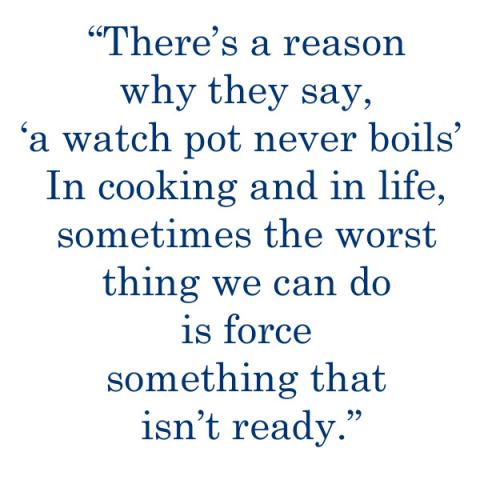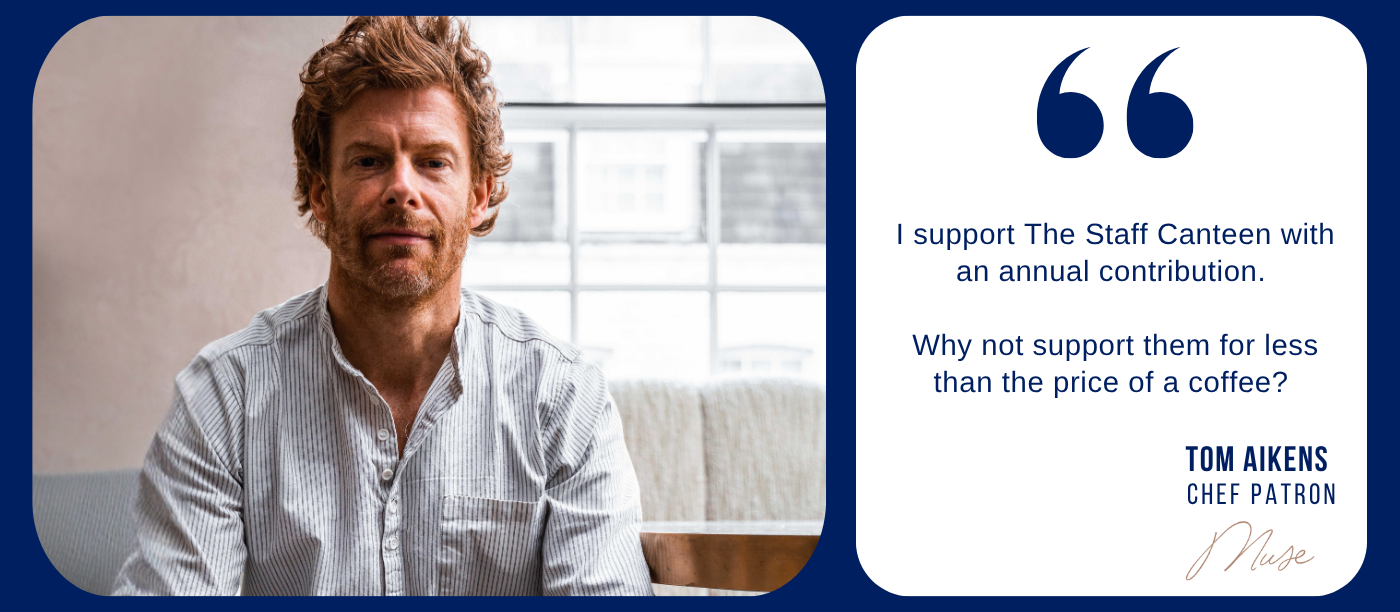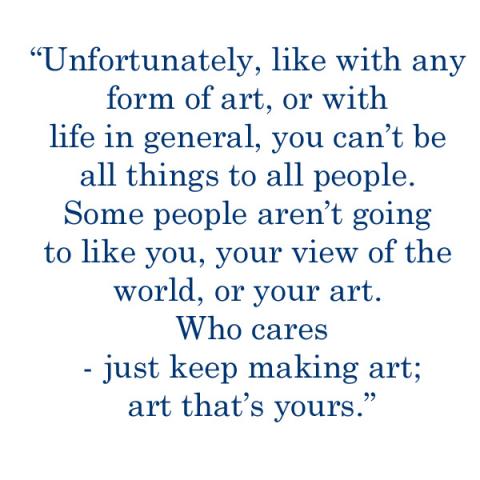Chef Chris Hill, who opened his first restaurant at 28 after leaving the business world behind him, shares some of the things he believes a chef can teach you in his blog, 15 Life Lessons A Chef Can Teach You.
In this blog chef and author, Chris Hill details the top things he believes we can learn from any chef.
 Chefs have a unique perspective of the world. We work in blistering hot, close quarters with a bunch of folks mom would probably write off as misfits. Look at the top notch restaurants — there’s an understanding, everything starts at the top. It’s the visionary in the kitchen, the leader, coach and empowerment guru keeping things in sync. It’s the chef. This is what you can learn from them.
Chefs have a unique perspective of the world. We work in blistering hot, close quarters with a bunch of folks mom would probably write off as misfits. Look at the top notch restaurants — there’s an understanding, everything starts at the top. It’s the visionary in the kitchen, the leader, coach and empowerment guru keeping things in sync. It’s the chef. This is what you can learn from them.
Patience. In the kitchen, you just can’t rush things. Like the science of anything, it takes time to cook things properly. There’s a reason why they say, ‘a watch pot never boils’. In cooking and in life, sometimes the worst thing we can do is force something that isn’t ready.
You get what you pay for. Whether it’s employees, fresh produce or utensils, what you put in is directly proportional to what you get out. Cast iron skillets, jumbo lump crab meat and reliable line can come at a hefty price, but rarely will they ever let you down.
Control the environment (as best you can). Obviously you can’t control everything around you, but the more you focus on the things you can, the better prepared you will be for when the uncontrollable situations arise. In restaurant kitchens, we call that mise-en-place, meaning ‘put in place’. Chefs set up their stations before service methodically so that when they need a sprig of thyme, they know where it is, and so they aren’t having to scamper through the kitchen looking for tongs.
The customer isn’t always right (however, sometimes we have to act like they are). This sucks, and this doesn’t mean that they are right, it just means that every now and again you just have to kiss a little ass.
Teamwork. Simply put, restaurant kitchens don’t work with out a tremendous amount of teamwork. It’s built on looking out for the other guy, communication, collaboration, and stepping up to the plate because someone got sick and it’s your day off, but the head chef needs you to come, and you do come in, and then when you are sick, he returns the favor. This exact dynamic is created through relying on each other on a busy-as-hell Friday Night. We all need help at some point, offer it, before someone has to ask for it.
Our most proud moments are usually born out of difficulty. Any good kitchen is gonna get its ass kicked on a regular basis. In the midst of the ‘weeds’, and as the chatter of the printer seems like it will never stop, sometimes you feel overwhelmed, stressed and in over your head. But like anything, the storm will pass, and you will come out on the other side, feeling fully alive. You can look around and say, ‘damn right’ — knowing you made it and are better off for it.
 Attitude. It’s contagious, this can be a game-changer or your Achilles Heel depending on which side of the fence you are looking over. One thing is true, just about every chef in the country would rather hire a hardworking son of a gun with little experience, but has a contagiously positive attitude, over some pretentious prick who talks a big game, who maybe can cook. It just works out that way — good attitudes and good vibes are contagious. They resonate through entire groups of people. When you have it, it’s hard not to sprinkle it around. Sprinkle that shit everywhere.
Attitude. It’s contagious, this can be a game-changer or your Achilles Heel depending on which side of the fence you are looking over. One thing is true, just about every chef in the country would rather hire a hardworking son of a gun with little experience, but has a contagiously positive attitude, over some pretentious prick who talks a big game, who maybe can cook. It just works out that way — good attitudes and good vibes are contagious. They resonate through entire groups of people. When you have it, it’s hard not to sprinkle it around. Sprinkle that shit everywhere.
Experience (nothing can replace it). I screwed up hollandaise sauce hundreds of times before perfecting it, and how many times have I overcooked steak, before figuring out a reliable way to calculate it’s doneness? A LOT. Before mastering anything, effort and experience teach us the things not to do, the pitfalls to side step around, and the mental errors to avoid, so that once we are competent in cooking or in anything else, it becomes human nature. Experience allows us to grow into discipline, learning the tools needed to become successful.
You can’t make everyone happy, so stop trying to. As chefs, we like to create things a certain way, it’s how we express ourselves. We are born to think outside of the box. Unfortunately, like with any form of art, or with life in general, you can’t be all things to all people. Some people aren’t going to like you, your view of the world, or your art. Who cares — just keep making art; art that’s yours. Build your own damn box.
Perspective. Every good chef has found a way to put things into proper perspective. When your product is ever-changing and you are in essence catering to a certain group of people, you find that things rarely go as planned. Some call it Murphy’s Law, I just call it life,


 Chefs have a unique perspective of the world. We work in blistering hot, close quarters with a bunch of folks mom would probably write off as misfits. Look at the top notch restaurants — there’s an understanding, everything starts at the top. It’s the visionary in the kitchen, the leader, coach and empowerment guru keeping things in sync. It’s the chef. This is what you can learn from them.
Chefs have a unique perspective of the world. We work in blistering hot, close quarters with a bunch of folks mom would probably write off as misfits. Look at the top notch restaurants — there’s an understanding, everything starts at the top. It’s the visionary in the kitchen, the leader, coach and empowerment guru keeping things in sync. It’s the chef. This is what you can learn from them. Attitude. It’s contagious, this can be a game-changer or your Achilles Heel depending on which side of the fence you are looking over. One thing is true, just about every chef in the country would rather hire a hardworking son of a gun with little experience, but has a contagiously positive attitude, over some pretentious prick who talks a big game, who maybe can cook. It just works out that way — good attitudes and good vibes are contagious. They resonate through entire groups of people. When you have it, it’s hard not to sprinkle it around. Sprinkle that shit everywhere.
Attitude. It’s contagious, this can be a game-changer or your Achilles Heel depending on which side of the fence you are looking over. One thing is true, just about every chef in the country would rather hire a hardworking son of a gun with little experience, but has a contagiously positive attitude, over some pretentious prick who talks a big game, who maybe can cook. It just works out that way — good attitudes and good vibes are contagious. They resonate through entire groups of people. When you have it, it’s hard not to sprinkle it around. Sprinkle that shit everywhere.
 Slow and steady wins the race. If you’ve done any barbecuing, you’ve heard the term, ‘low and slow’ which relate to the fact that tougher cuts of meat take a hell of a long time to cook at a reasonably low temperature — this allows the inter-muscular tissues to break down. You have to do it this way or your guests will hate you, and no amount of BBQ sauce can cover up your blunder. Ever been driving on the interstate, at the normal speed of traffic, and then some idiot comes shooting past you? Yeah, I thought so, we’ve all been there. Two miles later, we pass them as the red and blue lights are nestled closely behind their car. Yes, slow and steady wins the race, almost every time.
Slow and steady wins the race. If you’ve done any barbecuing, you’ve heard the term, ‘low and slow’ which relate to the fact that tougher cuts of meat take a hell of a long time to cook at a reasonably low temperature — this allows the inter-muscular tissues to break down. You have to do it this way or your guests will hate you, and no amount of BBQ sauce can cover up your blunder. Ever been driving on the interstate, at the normal speed of traffic, and then some idiot comes shooting past you? Yeah, I thought so, we’ve all been there. Two miles later, we pass them as the red and blue lights are nestled closely behind their car. Yes, slow and steady wins the race, almost every time. Chef Chris Hill left a job in the business world to follow his heart and passion into the world of cooking and the kitchen. Chris opened his first restaurant at 28 and grew into the role of executive chef.
Chef Chris Hill left a job in the business world to follow his heart and passion into the world of cooking and the kitchen. Chris opened his first restaurant at 28 and grew into the role of executive chef.









